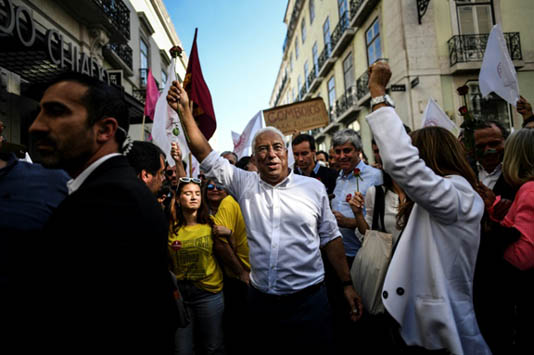LISBON, Oct 6, 2019 (BSS/AFP) – Portugal votes on Sunday with Prime
Minister Antonio Costa’s Socialists tipped to win a second straight term
after presiding over a period of solid economic growth following years of
austerity.
Costa’s likely re-election bucks the trend of declining centre-left
fortunes and the rise of far-right, populist parties seen elsewhere in
Europe.
Final opinion polls published Friday put support for the Socialist Party
(PS) — which has governed for the past four years with the backing in
parliament of two smaller hard-left parties — at 36-39 percent, compared to
25-30 percent for nearest rivals the centre-right Social Democrats (PSD).
If these results are confirmed the PS would boost their number in
Portugal’s 230-seat parliament but still fall short of an absolute majority,
meaning former Lisbon mayor Costa would once again need the support of at
least one other leftist party to govern.
Polling stations open at 8:00 am (0700 GMT) and will close at 7:00 pm (1800
GMT), with results announced later on Sunday.
– Growth up, deficit down –
After coming to power in 2015, Costa, 58, moved quickly to undo some of the
unpopular austerity measures introduced by the previous PSD-led government in
return for a 78-billion-euro ($85 billion) international bailout that kept
finances afloat after Portugal was clobbered by the eurozone debt crisis.
Taking advantage of the global economic recovery, he reversed cuts to
public sector wages and pensions while still managing to bring the budget
deficit down to nearly zero this year — the lowest level since Portugal’s
return to democracy in 1974.
On his watch Portugal’s economic growth was higher than the European
average in recent years — 3.5 percent in 2017 and 2.4 percent in 2018 —
while the jobless rate fell the level before the debt crisis.
“Every vote counts and we need a strong PS to guarantee four more years of
stability,” Costa said Friday on the last day campaigning was allowed.
His main adversary, PSD leader Rui Rio, has railed against high taxes and
inadequate public investment, which he argues are hurting public services,
but he appears to have accepted defeat.
“It would be nice to be able to say that I am almost sure to win, but it is
not the case,” he said during an interview with TSF radio on Friday.
– New ally? –
Rio has managed to reduce the margin separating the PSD and the PS in
recent weeks, especially after a scandal concerning former defence minister
Jose Azeredo Lopes resurged.
Lopes was charged last week with abuse of power and denial of justice over
his role in the alleged cover-up of an arms theft from a military depot two
years ago.
The tensions of the campaign appeared to be getting to the outgoing
premier.
When an elderly voter challenged him during a final campaign appearance on
Friday in Lisbon over the government’s handling of wildfires in central
Portugal in June 2017 that killed more than 60 people, the normally affable
Costa lost his temper.
The two parties which propped up Costa’s previous government — the
Communists and the Left Bloc — together have about 17 percent support,
slightly less than the score they obtained in the last election.
But Sunday’s vote could give him another potential government ally as polls
suggest an upstart People-Animals-Nature party (PAN) founded by a Buddhist
philosopher could ride a wave of concern about climate change and capture
three to four percent of the vote, giving it a potential kingmaker role.
“The most probable outcome is a Socialist party minority government with
support from radical left parties or, less likely, the small environmentalist
party PAN,” said Federico Santi, an analyst at political risk consultancy
Eurasia Group.



